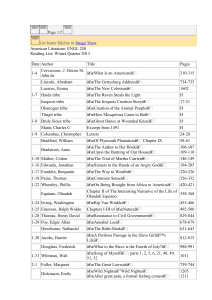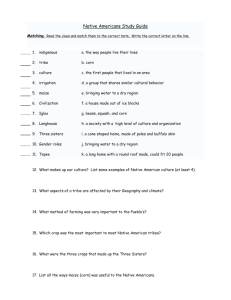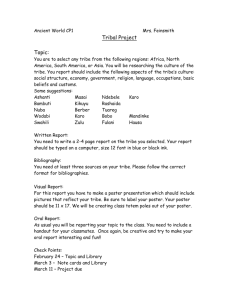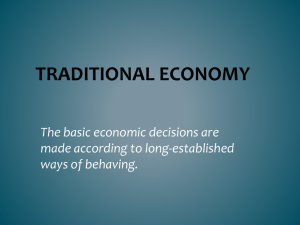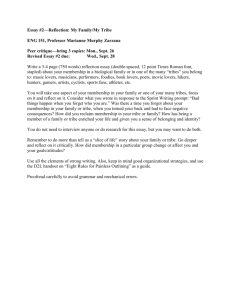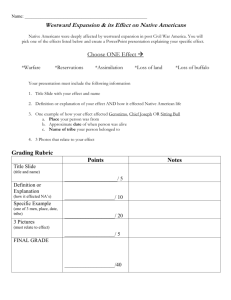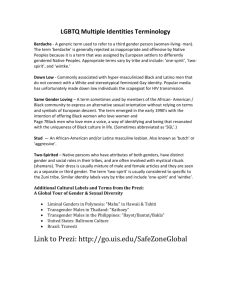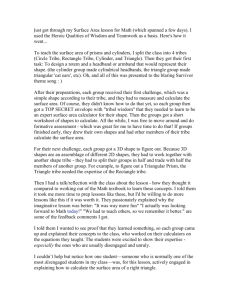Looking into the rainforest and seeing salvation
advertisement
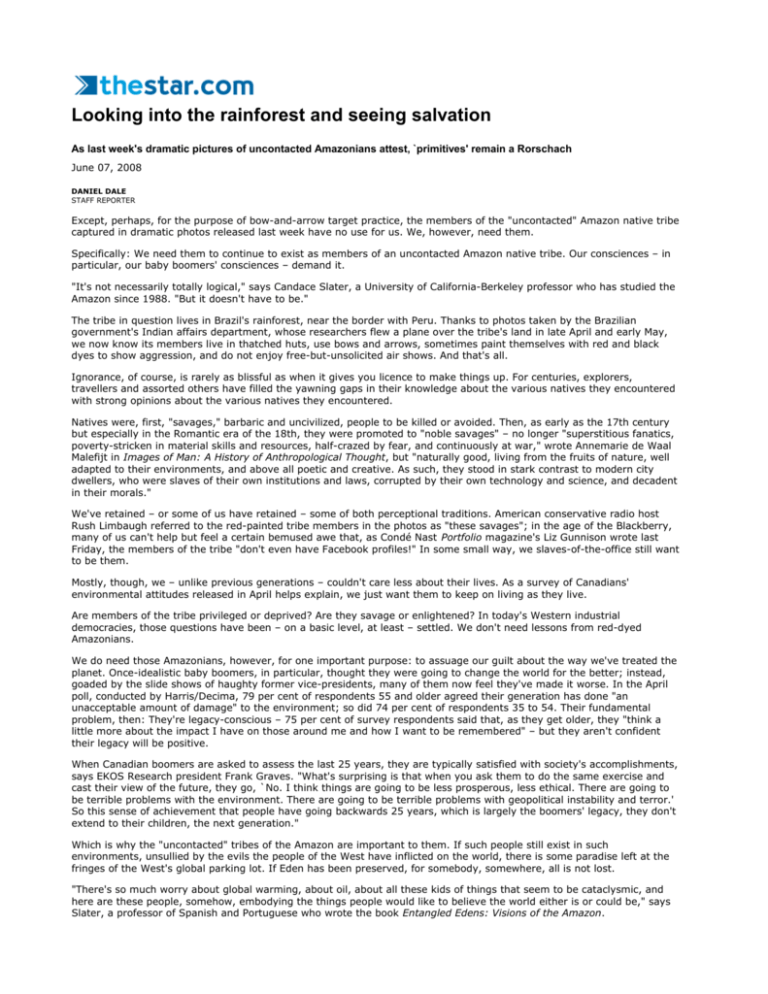
Looking into the rainforest and seeing salvation As last week's dramatic pictures of uncontacted Amazonians attest, `primitives' remain a Rorschach June 07, 2008 DANIEL DALE STAFF REPORTER Except, perhaps, for the purpose of bow-and-arrow target practice, the members of the "uncontacted" Amazon native tribe captured in dramatic photos released last week have no use for us. We, however, need them. Specifically: We need them to continue to exist as members of an uncontacted Amazon native tribe. Our consciences – in particular, our baby boomers' consciences – demand it. "It's not necessarily totally logical," says Candace Slater, a University of California-Berkeley professor who has studied the Amazon since 1988. "But it doesn't have to be." The tribe in question lives in Brazil's rainforest, near the border with Peru. Thanks to photos taken by the Brazilian government's Indian affairs department, whose researchers flew a plane over the tribe's land in late April and early May, we now know its members live in thatched huts, use bows and arrows, sometimes paint themselves with red and black dyes to show aggression, and do not enjoy free-but-unsolicited air shows. And that's all. Ignorance, of course, is rarely as blissful as when it gives you licence to make things up. For centuries, explorers, travellers and assorted others have filled the yawning gaps in their knowledge about the various natives they encountered with strong opinions about the various natives they encountered. Natives were, first, "savages," barbaric and uncivilized, people to be killed or avoided. Then, as early as the 17th century but especially in the Romantic era of the 18th, they were promoted to "noble savages" – no longer "superstitious fanatics, poverty-stricken in material skills and resources, half-crazed by fear, and continuously at war," wrote Annemarie de Waal Malefijt in Images of Man: A History of Anthropological Thought, but "naturally good, living from the fruits of nature, well adapted to their environments, and above all poetic and creative. As such, they stood in stark contrast to modern city dwellers, who were slaves of their own institutions and laws, corrupted by their own technology and science, and decadent in their morals." We've retained – or some of us have retained – some of both perceptional traditions. American conservative radio host Rush Limbaugh referred to the red-painted tribe members in the photos as "these savages"; in the age of the Blackberry, many of us can't help but feel a certain bemused awe that, as Condé Nast Portfolio magazine's Liz Gunnison wrote last Friday, the members of the tribe "don't even have Facebook profiles!" In some small way, we slaves-of-the-office still want to be them. Mostly, though, we – unlike previous generations – couldn't care less about their lives. As a survey of Canadians' environmental attitudes released in April helps explain, we just want them to keep on living as they live. Are members of the tribe privileged or deprived? Are they savage or enlightened? In today's Western industrial democracies, those questions have been – on a basic level, at least – settled. We don't need lessons from red-dyed Amazonians. We do need those Amazonians, however, for one important purpose: to assuage our guilt about the way we've treated the planet. Once-idealistic baby boomers, in particular, thought they were going to change the world for the better; instead, goaded by the slide shows of haughty former vice-presidents, many of them now feel they've made it worse. In the April poll, conducted by Harris/Decima, 79 per cent of respondents 55 and older agreed their generation has done "an unacceptable amount of damage" to the environment; so did 74 per cent of respondents 35 to 54. Their fundamental problem, then: They're legacy-conscious – 75 per cent of survey respondents said that, as they get older, they "think a little more about the impact I have on those around me and how I want to be remembered" – but they aren't confident their legacy will be positive. When Canadian boomers are asked to assess the last 25 years, they are typically satisfied with society's accomplishments, says EKOS Research president Frank Graves. "What's surprising is that when you ask them to do the same exercise and cast their view of the future, they go, `No. I think things are going to be less prosperous, less ethical. There are going to be terrible problems with the environment. There are going to be terrible problems with geopolitical instability and terror.' So this sense of achievement that people have going backwards 25 years, which is largely the boomers' legacy, they don't extend to their children, the next generation." Which is why the "uncontacted" tribes of the Amazon are important to them. If such people still exist in such environments, unsullied by the evils the people of the West have inflicted on the world, there is some paradise left at the fringes of the West's global parking lot. If Eden has been preserved, for somebody, somewhere, all is not lost. "There's so much worry about global warming, about oil, about all these kids of things that seem to be cataclysmic, and here are these people, somehow, embodying the things people would like to believe the world either is or could be," says Slater, a professor of Spanish and Portuguese who wrote the book Entangled Edens: Visions of the Amazon. "It's the untouched," she says, "the timeless, and in there the hope that somehow, things can still be saved. I think the Amazon continues to be something that is thought of as timeless, authentic, original...and even if you have one Indian tribe that's untouched, there's a sense that these are things that remain." A myth, probably – and a myth based on myths. It is highly unlikely, Slater, anthropologists and activists say, that the tribe in Brazil has never had contact with other groups, highly unlikely that it was completely unaware of Western civilization until the April flyover. The tribe is probably a remnant of a larger tribe that was decimated during the rubber boom about a century ago, says Fiona Watson, a Brazil expert and campaign co-ordinator for Survival International, a group that lobbies for the rights of tribal peoples. "And in the rubber boom," Watson says, "there were all sorts of atrocities – massacres, killing, enslavement, and many Indians died from disease...There's this very strong historical memory, and that kind of memory is handed down. I think that accounts for the fact that they clearly don't want contact." Even in Eden, unfortunately for us, there are no blank slates.
